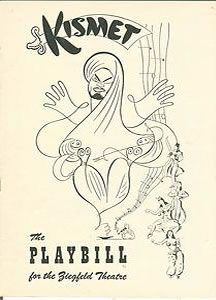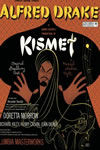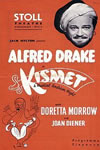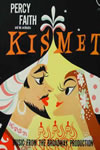Kismet is a musical that features musical adaptation along with an original score. The show uses themes of Alexander Borodin, with word setting and lyrics by Robert Wright and George Forrest. The most famous themes come from Borodin’s ‘Prince Igor’, such as the Polovtsian Dances, adapted into ‘Stranger in Paradise’. The plot concerns a wily poet whose beautiful daughter meets and falls in love with a young Prince, and is set in a fictional town in Baghdad around the same time of ‘Arabian Nights’. The original production was well received on both Broadway and in London, and has enjoyed numerous revivals by Opera companies, due to it’s heavily classical score. A film version was also very popular and was released in 1955 under the MGM label.

Robert Wright and George Forrest, Based on the music of Alexander Borodin
Robert Wright
Charles Lederer and Luther Davis
The themes of Borodin
Charles Lederer & Edwin Lester
Albert Marre
Jack Cole

Original Broadway Production
Ziegfeld Theatre - Opened 3 Dec 1953, closed 1 Jan 1970
Cast: Alfred Drake, Richard Kiley, Joan Dienner, Doretta Morrow & Henry Calvin

Original London Production
The Stoll Theatre (Now the Peacock Theatre) - Opened 1 Apr 1955, closed 14 Dec 2012

Kismet Broadway Revival
New York City Opera - Opened 22 Jun 1965, closed 1 Jan 1970

London Revival
ENO London Coliseum - Opened 1 Jun 2007, closed 1 Jan 1970
Cast: Michael Ball and Alfie Boe
What was your favourite production? Add your thoughts in the comments box
In Baghdad, a poet sits outside a Mosque attempting to sell his verses. His daughter Marsinah attempts to help him but goes off the Bazaar to steal her breakfast. As the poet begins to beg, he curses those who do not give him money. Jawan kidnaps him thinking he is Hajj and demands he lift a curse placed on him 15 years ago, resulting in the loss of his son. The poet sees an opportunity and pretends to do so in return for 100 golden pieces.
The evil Wazir enters along with his seductive wife-of-wives Lalume and they discuss a loan that he needs. In return for the money that has been lent from the King of Ababu, the Caliph has to marry one or all three of the Princesses of Ababu. The Princesses tell Lalume they wish to return home.
Marsinah is chased by a market seller who knows she has stolen from them. Her father bails her out and gives his daughter half of the money. Whilst she considers how to spend it, the Caliph, who has disguised himself is taken with her beauty. The poet is arrested for setaling as Marsinah has found a house for her and her father to live. The Caliph disguises himself as a gardener and enters the house and the two instantly fall in love. They promise to meet later by moonlight.
Hajj is on trial for stealing and the Wazir sentences him to lashes and his right hand cut off. He begs that as a poet this will ruin his career. Lalume is attracted to the poet and begs the Wazir to spare him just as Jawan is brought in and it is revealed that the Wazir is his son. Jawan praises the poet and his ability to lift curses, but the Wazir sentences his own father to death. The Wazir is worried that the poet has cursed him and is about to kill him when the Caliph enters and says he has found a bride that he will marry that evening. The Wazir realises that if the Caliph doesn’t marry one of his daughters then his life will be ruined. He begs Hajj to right this wrong with his magic powers, promising him a reprieve and an important title. Hajj agrees and causes a diversion, escaping and leaving the Wazir with his cloak.
The Caliph sets off to be married but Marsinah thinks only of the gardener. Hajj returns and says they must flee but she refuses to go. They fight and run off, meaning that the Caliph enters the garden and finds his love not ther.
The Wazir finds out that the bride has gone and thinks that Hajj’s magic has worked. He tells his wife to make Hajj happy and gives him the title of Emir. The Caliph tells the Wazir that they must find his love just as Marsinah enters with the Harem and asks her father to help find her love. The Caliph sees Marsinah in the Harem and is upset that she is apart of the Wazir’s troop. The Wazir claims her as one of his wives. He is heartbroken and finally agrees to choose his wive-of-wives that evening. The Wazir marries Marsinah against her will.
The candidates for the Caliph’s hand dance for him but he is unmoved. Hajj realises what has happened and takes a blank plaque from his turban and throws it into the pool. He says that when it is retrieved, it will say the name of his intended bride. As The Wazir enters the pool, Hajj holds him underwater until he drowns. The Caliph realises what has happened and is reunited with Marsinah. Hajj is reunited with Lalume and is banished to an Oasis with her.
Act I
- Sands of Time
- Rhymes Have I
- Fate
- Bazaar Of The Caravans
- Not Since Nineveh
- Baubles, Bangles And Beads
- Stranger In Paradise
- He’s in love
- Gesticulate
- Night of My Nights
- Was I Wazir?
- Rahadlakum
- And This Is My Beloved
- The Olive Tree
- Zubbediya
- Bored
- The Hand of Fate
- Stolen Oranges
- Paradise Garden
- The Poets Meet
1954 Tony Awards: Best Musical, Best Performance by a Leading Actor in a Musical (Drake), Best Conductor and Musical Director.
UK: Josef Weinberger
USA: Musical Theatre International
